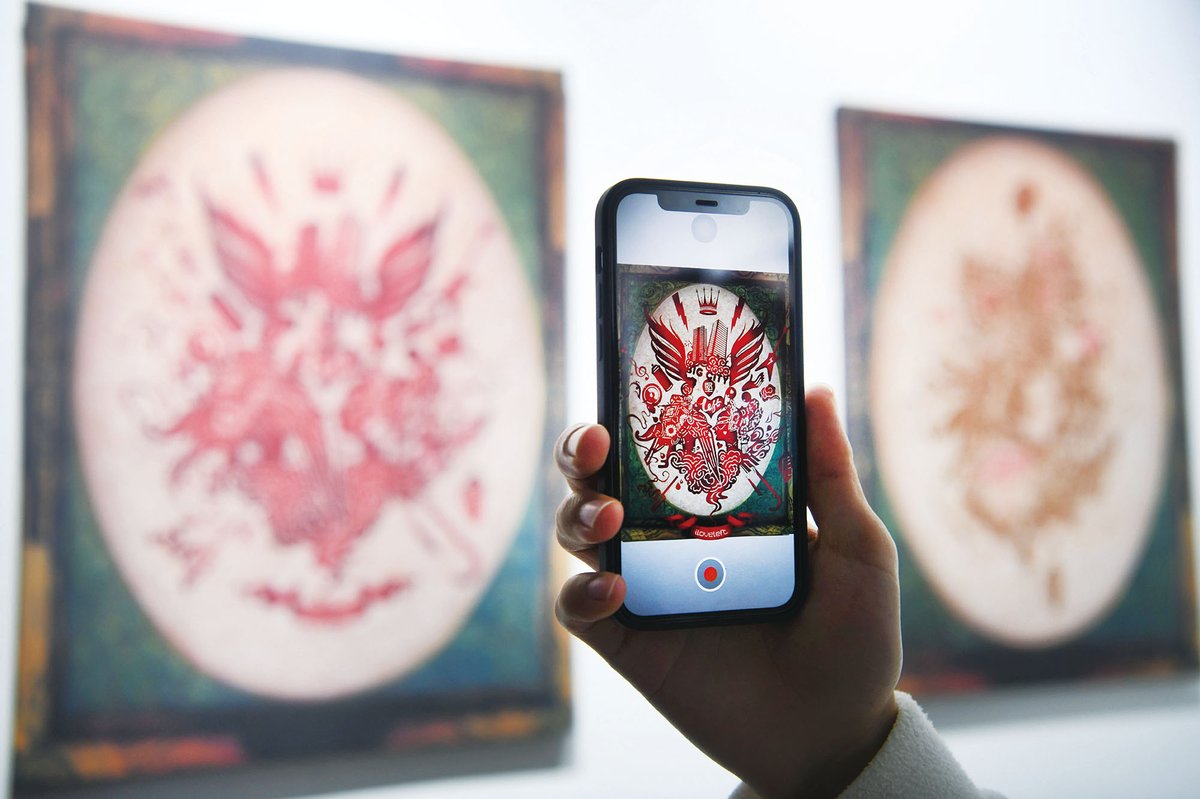NFTs are increasingly popular in China’s art world, but their dubious legal status may stop them from taking off
By day, Eminem Guo is a worker at a state-owned enterprise in Shenzhen. But after hours, he’s selling on a black market. Together with other anonymous Chinese internet users, “Kelly” and “Marktim,” he has set up “Tiger Club,” an account selling digital art as Non-Fungible Tokens (NFTs) on sales platform OpenSea.
Although NFTs are technically banned in China, there is huge interest in the country: Chinese servers dominated global Google searches on NFTs in 2021 according to Google Trends. Some are tapping into the action covertly, seeking untold riches potentially just a VPN connection away.
NFTs are a complicated subject—in a nutshell, they are usually a digital image that is assigned value by being unique. They can be traded digitally, as long as they are attached to a cryptocurrency, like Ethereum (ETH) or Bitcoin, which keep records of all exchanges to guarantee against fraud or forgery.
But although there are many applications for NFTs, they are mostly associated with expensive digital artwork, both in China and globally. This can largely be ascribed to the jaw-dropping 69 million US dollars price set at Christie’s auction last year for an NFT titled Everydays: The First 5000 Days by digital artist Beeple, as well as the nearly ubiquitous collection of “Bored Ape” and “CryptoPunk” avatars, which have fetched astronomical sums as more and more celebrities buy and use them as profile pictures.
Guo (who did not want to share his real name with TWOC) bought his first NFT in December 2020, but was inspired to get involved with creating and selling them when one of his favorite actors, Shawn Yue, sold his profile picture on social media as an NFT for over 5.9 million US dollars at a Christie’s auction in Hong Kong in September 2021.
The Tiger Club NFTs are anime portraits of an exasperated-looking tiger. These cartoon portraits of animals, each only slightly unique in color, character, and style from one another, echo famous NFT collections from the West.
That’s not accidental. Like many other young Chinese creators, Guo and his cohort are influenced by “the fashion of the times,” as he claims, and have chosen to emulate this by outfitting their tigers with a variety of up-to-date outfits, hats, glasses, necklaces, and other mix-and-match accessories, which they manually paint on their computer before uploading to OpenSea. That means they only have 26 images on their account, whereas their inspirations, the Bored Ape Yacht Club and CryptoPunks, use AI to create tens of thousands.
Although the aesthetic of Tiger Club may not be totally original, they’ve still made Guo a millionaire—sort of. The money he has made is illegal in China: The People’s Bank of China outlawed domestic trading of cryptocurrencies in 2017 due to the risks of rampant speculation and the lack of centralized control. Chinese traders could still trade on foreign platforms until the NFT boom last year spooked regulators.
In October 2021, at a convention on NFTs, three of China’s largest internet companies (Alibaba’s Ant Group, Tencent, and JD.com) reaffirmed their commitment to keep NFTs away from cryptocurrency by linking them to the yuan. This allows them to continue trading NFTs, referred to as “digital collectibles.”
The trade in digital collectibles in China is now more centralized. To trade on Chinese e-commerce or blockchain platforms, users must upload their phone and ID number, and only pay in yuan. They cannot exchange or resell for 180 days after purchasing, to curb speculation.
Guo views the measures as ineffective for those who are already involved in NFT trading, as he has sold two of his works for 36 ETH each (about 1.2 million yuan at the time of writing). “If you really want to sell you can do an underhand trade,” he says. He thinks the regulations are “pointless,” as all they do is force creators to keep their digital assets online when it could be circulated back into China.
This also prevents potential artists from sharing their work with domestic audiences when there’s much more money to be made elsewhere. “Of course, I would rather sell my artwork in China. I actually believe the entrepreneurial environment and potential for artists is somewhat better here,” Guo claims. He suggests China needs its own version of OpenSea, with more freedom to buy and sell. “Then we can move forward as artists.”
But regulations haven’t deterred others: 27-year-old freelance artist Song Ting has attracted attention with her psychedelic digital collectibles based on traditional Chinese artwork like the Mogao Caves in Dunhuang, Gansu province. In the past year, she has partnered with Tencent and KFC, and seen one piece sell for 667,000 yuan. The system will likely encourage those who work within it.
Full disclosure: Rory Mencin is an art curator sourcing Chinese NFT artists for the international market.
A Token Project: Can NFT Art Flourish in China? is a story from our issue, “State of The Art.” To read the entire issue, become a subscriber and receive the full magazine.













